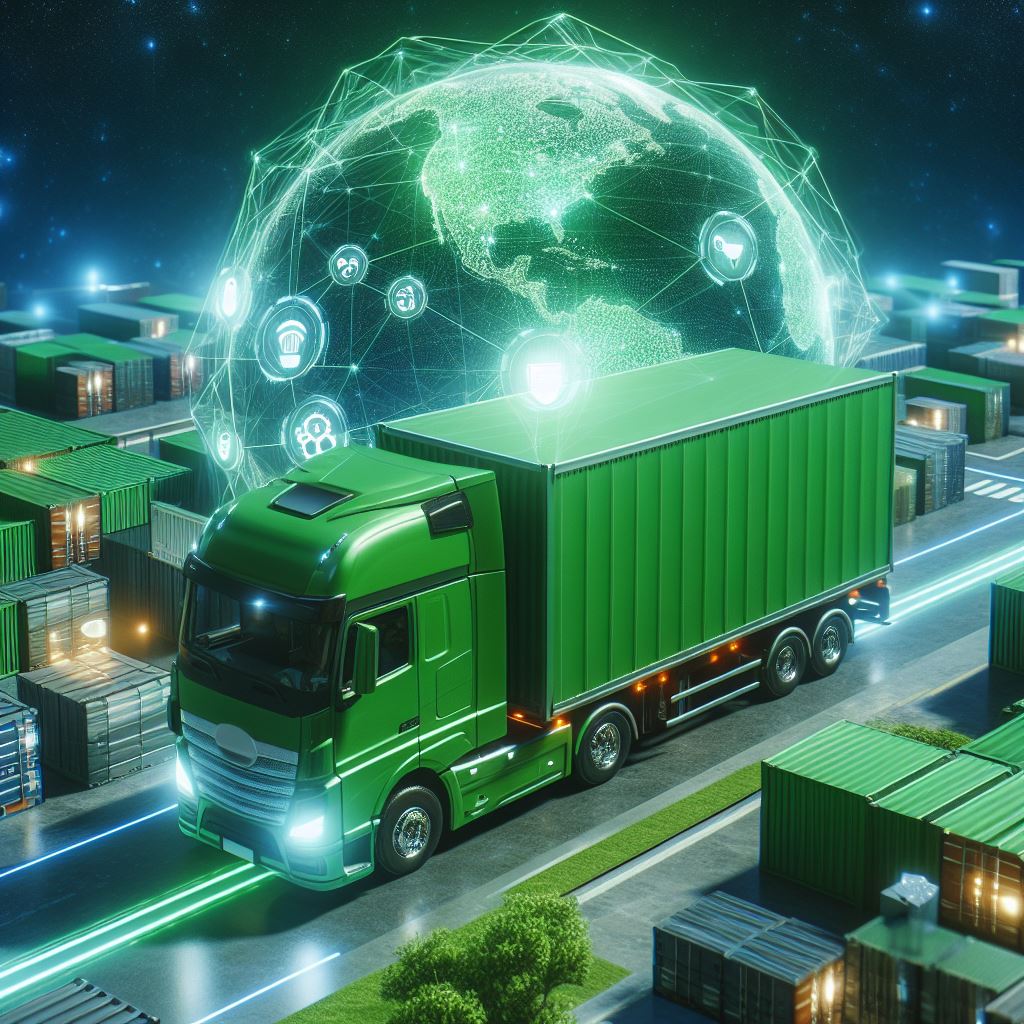Boosting Fuel Efficiency: The Impact of AI on Logistics
Research by McKinsey estimates that logistics companies will generate $1.3-$2 trillion per year for the next 20 years in economic value by adopting AI into their processes. In an era where sustainability and efficiency are paramount, the integration of artificial intelligence (AI) stands out as a game-changer in the realm of logistics.
From optimizing routes to enhancing vehicle performance, AI holds the promise of significantly boosting fuel efficiency, thereby revolutionizing the way goods are transported worldwide. Join us as we delve into the profound impact of AI on logistics, exploring how this technology is reshaping the industry landscape and driving toward a more sustainable future.
The Rising Tide of Logistics Costs
In today’s fast-paced world, the logistics industry serves as the backbone of global commerce, ensuring goods reach their destinations swiftly and efficiently. However, this essential service comes at a cost—a cost that’s steadily rising year by year. Let’s take a closer look at why logistics costs are on the rise and the environmental consequences that accompany them.
Primarily, fuel prices are soaring, placing a significant strain on logistics companies’ budgets. With fuel being a primary expense in transportation, even small fluctuations in prices can have a substantial impact on operating costs. As global energy demand continues to grow and geopolitical tensions affect oil markets, the outlook for fuel prices remains uncertain.
Moreover, the rise of e-commerce has led to a surge in demand for faster deliveries. Consumers now expect their packages to arrive at their doorstep within days, if not hours, of placing an order. This demand for speed puts pressure on logistics providers to optimize their processes and invest in technologies that enable quicker turnaround times.
However, pursuing speed often comes at the expense of sustainability. The logistics industry is a significant contributor to greenhouse gas emissions, with trucks, ships, and planes burning fossil fuels and releasing carbon dioxide into the atmosphere. These emissions not only contribute to climate change but also exacerbate air pollution and harm public health.
Fuel Efficiency: The Untapped Potential
Fuel efficiency stands as a beacon of untapped potential within the realm of logistics. Beyond merely reducing costs, it represents a cornerstone in the industry’s journey towards environmental sustainability. Even minor enhancements in fuel efficiency can yield substantial savings and contribute to a significantly reduced carbon footprint.
Traditionally, logistics companies have turned to various methods to optimize fuel consumption. Route planning software has been a go-to solution, enabling businesses to map out the most efficient paths for their vehicles, minimizing distance traveled and fuel expended. Likewise, driver training programs have sought to instill best practices, such as maintaining steady speeds, avoiding excessive idling, and adhering to optimal acceleration and braking patterns.
While these methods have proven beneficial to some extent, they often fall short of unlocking the full potential of fuel efficiency. Route planning software, for instance, may overlook dynamic factors such as traffic congestion, weather or road closures, leading to suboptimal routes. Similarly, while driver training programs can impart valuable skills, they may struggle to enforce consistent adherence to best practices across an entire fleet.
AI-powered Solutions for Fuel Efficiency
In the dynamic landscape of logistics, where every mile counts and every drop of fuel matters, the integration of AI has emerged as a game-changer in the quest for fuel efficiency. AI-powered solutions offer a sophisticated approach to optimizing fuel consumption, leveraging data-driven insights and predictive analytics to revolutionize the way logistics companies manage their fleets.
-
Route Optimization
Traditionally, route planning methods have relied on historical data and static factors, providing a rigid framework that fails to adapt to the fluidity of real-world conditions. This approach often leads to inefficiencies, with vehicles navigating suboptimal paths, encountering delays, and consuming excess fuel along the way. Enter AI, the transformative force that revolutionizes route optimization by harnessing the power of real-time data and predictive analytics. AI algorithms can analyze a multitude of dynamic factors, including traffic congestion, weather and road closures, to create dynamic and fuel-efficient routes that adapt on the fly.
AI algorithms can leverage historical fuel consumption data for specific routes to fine-tune their optimization strategies. By analyzing past performance metrics and identifying patterns, the algorithm can identify the most fuel-efficient paths for each journey, taking into account factors like elevation changes, road surface conditions, and traffic flow dynamics.
-
Predictive Maintenance
Where logistics is concerned, maintaining peak performance isn’t just about reliability—it’s about fuel efficiency. Poorly maintained vehicles experience a noticeable drop in fuel efficiency. Wear and tear on components like engines, tires, and brakes can lead to increased resistance and energy consumption. Traditional maintenance schedules, often based on fixed intervals or mileage thresholds, pose significant challenges in this regard. They’re inherently reactive, requiring repairs or replacements only after issues arise, leading to costly downtime, unnecessary repairs, and potentially catastrophic breakdowns.
AI-powered predictive maintenance offers a proactive approach, leveraging the wealth of data collected from vehicle sensors to anticipate equipment failures before they occur. By analyzing real-time data streams on engine performance, oil pressure, tire pressure, and other critical parameters, AI algorithms can detect anomalies, identify patterns of wear and degradation, and predict when components are likely to fail. This foresight enables logistics companies to schedule preventive maintenance proactively, addressing issues before they impact fuel efficiency or lead to costly breakdowns.
-
Telematics and Driver Behavior Monitoring
In the dynamic world of modern logistics, staying ahead requires more than just knowing where your vehicles are—it’s about understanding how they’re performing every step of the way. This is where telematics comes into play, serving as the vigilant watchdog of fleet operations. Telematics utilizes GPS technology and onboard diagnostics to provide real-time monitoring of vehicles, offering insights into their location, speed, fuel consumption, and engine health.
Artificial intelligence (AI) takes this monitoring to the next level by analyzing the wealth of data collected by telematics systems to identify inefficient driving habits that contribute to fuel waste. AI algorithms can pinpoint behaviors such as harsh acceleration, speeding, and excessive idling, which not only consume more fuel but also increase wear and tear on vehicles.
For example, AI can detect instances of aggressive driving, where drivers accelerate rapidly and brake harshly, leading to increased fuel consumption and reduced efficiency. Similarly, AI can identify cases of speeding, where vehicles exceed safe and optimal speeds, burning fuel at a higher rate than necessary. Additionally, AI can monitor idling time, flagging instances where vehicles sit stationary for extended periods without any productive activity, wasting fuel and contributing to unnecessary emissions.
Beyond Efficiency: The Ripple Effect of AI in Logistics
Beyond its direct impact on fuel efficiency, the integration of AI-powered solutions in logistics initiates a ripple effect that cascades across various facets of the supply chain, ultimately leading to further optimization and sustainability benefits.
-
Optimized Loading and Unloading Procedures
AI can revolutionize loading configurations by analyzing factors such as cargo weight, size, and destination. By considering these variables, AI algorithms can determine the most efficient arrangement of goods within trucks or containers to maximize space utilization while minimizing fuel consumption. Furthermore, AI can dynamically adjust loading plans in real time, optimizing routes and distribution networks to ensure that vehicles are operating at maximum efficiency throughout their journeys.
-
Improved Warehouse Management and Inventory Control
In the realm of warehouse operations, AI offers unprecedented opportunities for optimization and efficiency gains. By analyzing historical data and real-time demand signals, AI algorithms can forecast inventory levels, anticipate stockouts, and optimize replenishment schedules to minimize disruptions and wasted journeys. Additionally, AI can optimize picking and packing processes by identifying the most efficient routes through the warehouse, minimizing travel distances and reducing fuel consumption.
-
Dynamic Routing and Fleet Management
AI can continuously analyze real-time data on traffic patterns, weather conditions, and delivery schedules to optimize routing decisions. By dynamically adjusting routes and reallocating resources based on changing conditions, AI maximizes fuel efficiency by reducing idle time, minimizing detours, and optimizing the use of vehicles in the fleet.
-
Predictive Inventory Management
AI algorithms can forecast demand with greater accuracy by analyzing historical sales data, market trends, and external factors. By predicting future demand more precisely, logistics companies can optimize inventory levels, reducing the need for excess stockpiling and minimizing the number of trips required for replenishment, thereby reducing fuel consumption and transportation costs.
-
Energy-Efficient Vehicle Technologies
AI can facilitate the adoption of energy-efficient technologies in vehicles, such as hybrid or electric powertrains, aerodynamic designs, and predictive maintenance systems. By leveraging AI to optimize vehicle configurations and maintenance schedules, logistics companies can reduce fuel consumption, lower emissions, and improve the overall sustainability of their fleets.
-
Supply Chain Visibility and Collaboration
AI-powered supply chain visibility platforms enable real-time monitoring of shipments, inventory levels, and supplier performance. By providing stakeholders with greater visibility and transparency across the supply chain, AI fosters collaboration and coordination, reducing the likelihood of delays, disruptions, and unnecessary trips, ultimately leading to improved fuel efficiency and operational efficiency.
-
Optimized Packaging and Cargo Handling
AI can optimize packaging designs and cargo loading procedures to maximize space utilization, minimize waste, and reduce the overall weight of shipments. By optimizing packaging and cargo handling processes, logistics companies can minimize the number of trips required for transportation, leading to reduced fuel consumption and lower environmental impact.
Wrapping Up
From the moment goods are loaded onto trucks to the final delivery at a customer’s doorstep, AI-powered solutions are quietly working behind the scenes, optimizing routes, managing fleets, and streamlining operations. But the impact goes far beyond just saving fuel—it touches every aspect of logistics, from warehouse management to supply chain visibility.
By harnessing the power of real-time data and predictive analytics, AI enables logistics companies to make smarter decisions, reducing fuel consumption, minimizing emissions, and ultimately driving down costs. But perhaps most importantly, AI empowers us to create a more sustainable future for generations to come.
Ready to improve logistics operations with AI for sustainable fuel efficiency? Contact RTS Labs now to explore tailored solutions and drive towards a greener, more efficient future in logistics!






